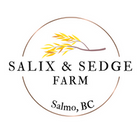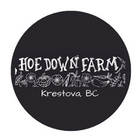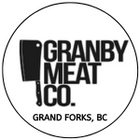April 4, 2024
Nathan Wild
FARM NEWS

Compost Complete!
This week we finished composting the garden. We also got our much anticipated soil test back. Soil health is at the foundation of everything that we do on our farm. Without healthy soil you can't grow highly nutritious food. That's why every year we get a soil test so we can see if there are any imbalances.
Our soil test results showed that we were slightly low in most of the major minerals and our PH wasn't quite high enough. This is great news because it's means we're not too far off from our ideal numbers. With some Dolomite lime to increase the PH, high quality compost and a few mineral amendments our soil should be at peak performance!

Oaks Unveiled: Nature's Architects Shaping Ecosystems and Cultural Landscapes
This is a great article by our friends and fellow farmers at Zero Fox Tree Crops. It explains the importance of the mighty oak tree. A keystone species that serves as the backbone of our local ecosystem, and without which the ecosystem would fail.
The article states “ Oaks hold a significant place in agroforestry and backyard food forests, where their robust presence supports and enhances these systems.
In silvopasture systems, a form of agroforestry, oaks stand as sentinels amidst grazing fields. Their broad canopies provide much-needed shade and shelter for livestock, particularly in the warmer months, reducing heat stress and increasing the comfort and health of the animals. This shade also helps to maintain cooler soil temperatures, preserving moisture and reducing the need for irrigation.
In return, the livestock contribute to the health of the oaks through natural fertilization processes, as their manure enriches the soil, promoting stronger tree growth as well as weed management by the consistent grazing.
In these systems, oaks are often strategically planted or retained in pastures to optimize their benefits. The layout is carefully planned to balance the need for open grazing areas with the benefits of tree cover. For instance, oaks may be planted in rows or in a scattered pattern to provide optimal coverage without impeding the movement of livestock or the operation of farm machinery.
Moving from the open fields of agroforestry to the more intimate setting of backyard food forests, oaks again play a pivotal role. In these environments, oaks act as the upper layer of a multilayered ecosystem. Underneath their canopy, a variety of plants can be grown, taking advantage of the light filtration through the oak leaves.
For example, shade-tolerant berry bushes like currants and raspberries can flourish in the dappled sunlight. Similarly, various herbs and groundcovers, such as comfrey and clover, can be planted to cover the soil and add additional yields, retaining moisture and adding nitrogen, enhancing soil fertility, and providing useful herbaceous material.
Moreover, the leaves and acorns from oaks contribute to the food forest's nutrient cycle. As they slowly decompose due to the high lignin content, they provide organic matter and keep the soil armored, enriching the soil and supporting the growth of surrounding plants. This natural mulching process also encourages a healthy population of soil microorganisms, essential for soil health and plant growth.
In both agroforestry systems and backyard food forests, oaks are more than just trees; they are central to creating sustainable, productive, and biodiverse landscapes.”
It turns out that planting a simple oak tree is one of the most beneficial acts ones can do for our local ecosystem. If you feel inspired to do so Zero Fox Tree Crops has an outstanding collection of oak tree seedlings ready to go!
CLICK HERE TO SEE OAK TREE COLLECTION
NEW PRODUCTS

Green Onions
Description: Green onions, also known as scallions, are an indispensable ingredient for flavoring dishes. Their mild onion flavor enhances any recipe, bringing your cooking to the next level.
Details: Sold per bunch.
Grown by Linden Lane Farms, Krestova.

Brioche Buns
Description: These are the same brioche hamburger buns that are used by many of the restaurants in Nelson during the famous annual Burger Month competition.
Made with organic locally-grown wheat, the texture is light and fluffy with a sweet yeasty flavour. These are without a doubt the best buns to use to showcase your world-class homemade hamburgers!
Details: Sold in a bag of 6 buns.
Made by The Kootenay Bakery Cafe, Nelson.

Wildflower Honey
Description: Discover the sweet, delicate taste of our locally sourced Wildflower Honey. Made from a variety of kootenay wildflowers, this pure honey is bursting with flavor and potential health benefits. Enjoy it in teas, baked goods, or simply drizzled over your favorite foods. Support local beekeepers and indulge in nature's sweetest treat!
Details: Sold in 500 ml jar.
Produced by Terry's Honey Farm, Grand Forks.

Bagels
Description: Start your day off right with our locally-made bagels! Made in-house by the famous Kootenay Bakery Cafe out of Nelson, these bagels are made with a nutritious blend of organic, locally-grown wheat. Enjoy the hearty texture and nutty flavours, perfect for any bagel lover.
Details: sold in a bag of six frozen bagels.
Available in multigrain, sesame and poppyseed.
Made by The Kootenay Bakery Cafe, Nelson.

Grass-Fed Cream Cheese
Description: Our Grass-Fed Cream Cheese is made with fresh raw milk from Kootenay-raised, grass-fed Jersey cows raised by Jerseyland Organics Farm in Grand Forks. It has a rich flavour with a creamy and smooth texture. Perfect for spreading on bagels or adding to your favorite recipes.
Details: Sold in a 250 gram container.
Produced by Jerseyland Organics Farm, Grand Forks.

Grass-Fed Sour Cream
Description: Our Grass-Fed Sour Cream is made with fresh raw milk from Kootenay-raised, grass-fed Jersey cows raised by Jerseyland Organics Farm in Grand Forks. It has that classic tangy sour cream flavour that will add a creamy zing to any dish.
Details: sold in a 250 gram container.
Produced by Jerseyland Organics Farm, Grand Forks.

Grass-Fed Feta Cheese
Description: This Grass-Fed Feta Cheese was made with fresh raw milk from Kootenay-raised, grass-fed Jersey cows raised by Jerseyland Organics Farm in Grand Forks. It has a salty, tangy flavour with a creamy texture. It makes an ideal pairing with salads, pasta, fruit, eggs and pizza.
Details: Comes in an approx. 275 gram container.
Produced by Jerseyland Organics Farm, Grand Forks.
NEW RECIPE

Chewy Brownies
Made with our Soft White whole wheat flour, these brownies are fudgy, chewy and highly addictive!
FOOD FOR THOUGHT 🍎

The Carbon Tax
I don't really follow politics and I definitely don't understand economics but what I've been hearing is that many people are upset about the new carbon tax because it will make food prices higher. But why?
They say the carbon tax will make food cost more because it'll make gas more expensive. As a result:
large-scale industrialized farms have to charge more for their crops because they rely on gas-powered tractors and heavy machinery to plant, manage and harvest their crops. They also have to pay more to truck in their imported petroleum-based fertilizers and agro-chemicals.
Once they harvest their crops they then truck them off to mass transportation facilities where they will be distributed to supermarkets and processing facilities across Canada.
Then, every family and single person has to drive their vehicle to the supermarket to buy their groceries.
What the carbon tax reveals is that our national food system is a heavy polluter. The problem isn't the tax, it's how we produce our food.
When you have an industrialized, centralized food system whose production and distribution is closely tied to the price of oil, a carbon tax will make food more expensive. But what would happen if we could create a food system that wasn't so dependent on oil?
In a small-scale, community-based, regenerative farming system the primary energy source is human labour.
The bulk of the nutrition needed to grow crops is high-quality compost which could easily be made locally from things like community food scraps, manure and woody materials.
And if a local distribution system was in place where locally-grown food could be gathered and deliver to everyone’s door, the transportation costs would be minimal and there would be less cars on the road driving to and from the supermarket.
Call me biased (because I am) but it seems like investing in local sustainable agriculture would reduce pollution and keep food prices low. Maybe instead of making gas cost more why don't we try making locally-grown food cost less?
🍅Save up to $200 by joining our Farm Membership! 🍅 Farm Members play a vital role in our farm business. By paying for food upfront you allow us to invest in seeds, new tools, equipment, ingredients, and infrastructure which greatly improves the overall financial stability of our farm.
CLICK HERE TO BECOME A MEMBER
⭐ Help us reach 100 Google reviews! ⭐
If you like what we’re doing and would like to help us spread the word, leaving a Google review can make a big impact. All you have to do is click the link below and leave a short review.
LEAVE A REVIEW




